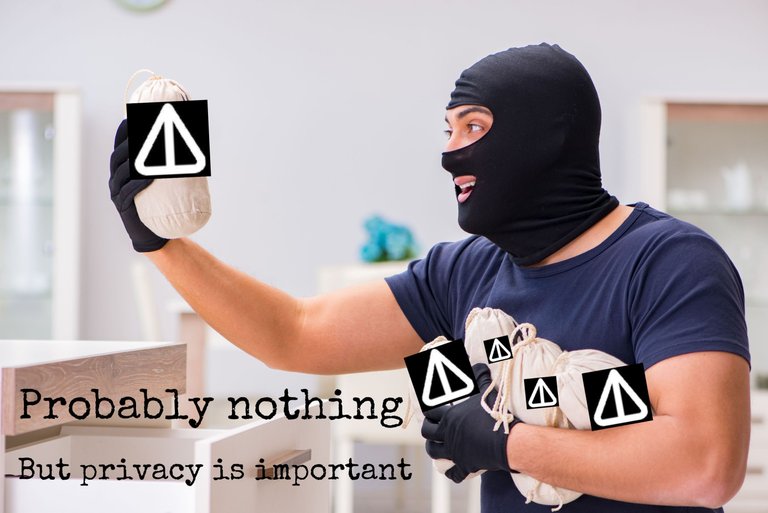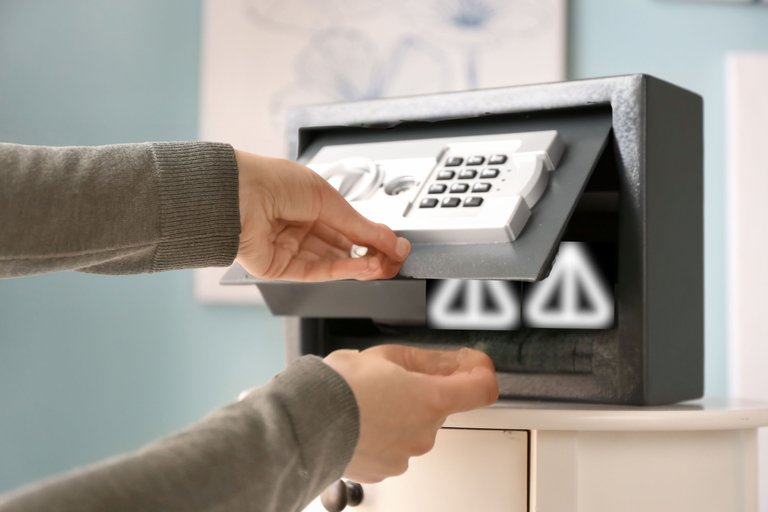Lets say, You're buying some $NOT on your TON Wallet. Now the wallet has a Recovery phrase as a security measure to keep your $NOT secured. I think you already know what a recovery phrase is used for, right? It is used for the recovery of the wallet in case something goes wrong. Also, anyone having access to that phrase can easily get access to your funds. So, it must be stored in someplace safe in a secured way, so that no one can get access to it but you. But what if someone else knew exactly where you kept it? And manages to get their hands on that. That wouldn't be very fun, right?

How 0ur 0nline Activities Are Constantly Monitored
Every time u send a message, browse the internet, or even just turn on your Wi-Fi, u're leaving a trail of digitaI footprints. These footprints can be picked up by aII sorts of people, including your friends, family, and even strangers. But the biggest worry is that the government and big tech companies are also watching. They have special tools and laws that let them peek into our online lives without us knowing. People's personal information, like names, pictures, and even what websites they visit, or sometimes even passwords and recovery phrases gets collected and stored by different companies and sometimes even by the government. This is called "DATA," and it's becoming more and more important to talk about whether this data should be kept private.
Why Is Data Privacy Important?
Data privacy means keeping your personal information safe. so that only you and people you trust can see it. you probably don't want just anyone to know everything about you, like what games you play, even what snacks you eat, or what crypto you are investing in right now (obviously $NOT, right?)
What Does the Government Do with Our Data?
Sometimes, the government uses special tools to keep us safe. For example, they might use cameras to catch bad guys or listen to calls to stop crimes. Governments around the world hav programs that let them spy on us. For eXampIe, the U.S. government has used the Foreign Intelligence Surveillance Act to secretIy access our emaiIs and phone caIIs. Sometimes, this information is shared with other countries, whch can lead to even mor spying.

To Safe or $NOT to safe?
You can decide what information you share online. It's important to read the ruules (called "terms of servise") and privacy policies of websites and apps before you start using them. This helps u understand wat information they collect and how they use it. Also, use a secured password manager like Bitwarden or KeePassXC. Make each and every password different from all the others. Never login to any public computer or unsecured network. Also, pay attention and be careful when opening and reading emails. Also, make sure no one is over looking your shoulder when typing out passwords in your workplace. Because why $NOT? It doesn't hurt being a little extra cautious.
Ending $NOTe
Living in a world where our online activities are constantly monitored can feel scary. Keeping our data private is important for our safety and freedom. By understanding how our data is used and taking steps to keep it safe, we can enjoy the fun things the internet offers while staying protected. So, remember to think carefully about what information you share online. But by understanding how this works and taking steps to protect ourselves, we can fight back and keep our privacy intact.
So what do you think? Shouldn't we care more about privacy and be as cautious as possible? What will you do to make sure that that's the case? I also invite you to the conversation. Share your thought in the comments below. Also if you found this post helpful and inspiring, send us a LIKE and FOLLOW my blog. Like it's not a necessity. But it really helps me to produce more content like these! Thank you for supporting me 💖 All your support goes back directly to creating more quality content.
ALL PHOTOS ARE FOUND WITH THE HELP OF CREATIVE COMMONS SEARCH ENGINE AND/OR THEY ARE AVAILABLE ON THE PUBLIC DOMAIN/LICENSED CC0/CREATED USING CANVA/AI UNLESS OTHERWISE SPECIFIED!
ᴵ ʳᵉˢᵉʳᵛᵉ ᵃˡˡ ʳᶦᵍʰᵗˢ ᵗᵒ ᵗʰᵉ ᶜᵒⁿᵗᵉⁿᵗˢ ᵒᶠ ᵗʰᶦˢ ᵇˡᵒᵍ. ᵀʰᵉ ˢᵒᵘʳᶜᵉ ᶜᵒᵈᵉ↗ ᶦˢ ˡᶦᶜᵉⁿˢᵉᵈ ᵘⁿᵈᵉʳ ᴹᴵᵀ↗.
ᶜᵒⁿⁿᵉᶜᵗ ʷᶦᵗʰ ᵐᵉ ⁻ ᴳᶦᵗᴴᵘᵇ↗ • ᴸᶦⁿᵏᵉᵈᴵⁿ↗ • ᴸᶦⁿᵏᵗʳᵉᵉ↗




